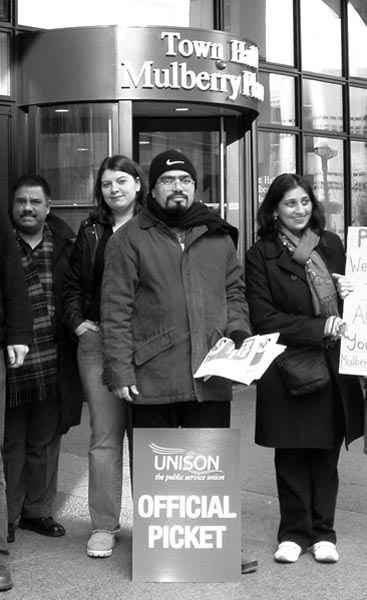Pay: New thinking needed
WORKERS, FEB 2008 ISSUE
Just before the Christmas break the TUC launched a unified and coordinated campaign of all public sector trade unions over pay – the rejection of the 2 per cent ceiling and diminishing offers during the next three years. Cynics will point out that if you want a campaign to be still-born then you ask the TUC to lead it. However all the public sector unions affiliated to the TUC turned up to what was effectively a zero reported campaign launch.

Photo: Workers So what is going to happen? All public sector trade unions are going to meet monthly. All are going to coordinate their claims and data supporting their claims. They are going to lodge their claims early. They are going to consult the members about what will be in the claim. They are going to consult each other. They are going to "build" support for a campaign. And that's it.
There is a lot of rhetoric about "smashing" Brown's wage restraint policy but little else. Workers in local government are looking at the comprehensive spending review offering spending increases on services of 1 per cent, 0.7 per cent and nothing during the next three years coupled with a 3 per cent efficiency saving – and seeing a cut.
Yet any minister who has paid the slightest attention to the sabre rattling of Unison over pay in the last 4 years will have noticed the absence of 75 per cent of the membership from even returning their ballot papers. Let alone that Unite and the GMB have rolled over without even going through the charade of a ballot.
There is also the prospect of dramatically extended "shared services provision" across local authorities, with outsourced services if not direct externalisation happening. The concept of the "public sector" worker having comparable terms and conditions and flexibility to transfer between parts of the shared public service – be it local government, civil service or NHS – is being actively developed.
Old boundaries of local services are being deliberately undermined. The breakdown of local and central government roles, devolution, regionalisation, dismantling of the British state under EU directives will destroy traditional areas of demarcation and distinctive roles. Likewise in health we see the concept of an NHS Passport promoted – you are a worker in the NHS but can move or be moved wherever the NHS requires you. The idea that the NHS provides a public service free at point of need irrespective of who owns the means to deliver that service is fundamental to government thinking – a NHS Passport passing seamlessly through myriad private companies, transferred so often that identity is lost. Worse, in the NHS most unions have rushed headlong to adopt pay review bodies to determine their pay, effectively giving up the right to bargain. Three-year deals have been the norm in the NHS for the past six years, so it is no surprise that the government is talking of another three-year deal.
As Workers has said previously there is the need for new thinking over public sector pay and how we improve it: the old days of big public sector pay disputes are gone. The challenge to all public sector unions is how to retain membership, bargaining, recognition, density, influence, and so on, in what is a dwindling public sector but growing alternative private, voluntary, and public partnership sector providing services to the public. Brown has clearly indicated he would welcome a public fight with the trade unions over pay – partly so that he can project his adopted aura of Thatcher reincarnate as well as go down in flames along with all his other failing policies. Getting the public sector TUC affiliates together is a start but new thinking, new ideas, new arguments are required to convince members that they can fight for wages – and win.